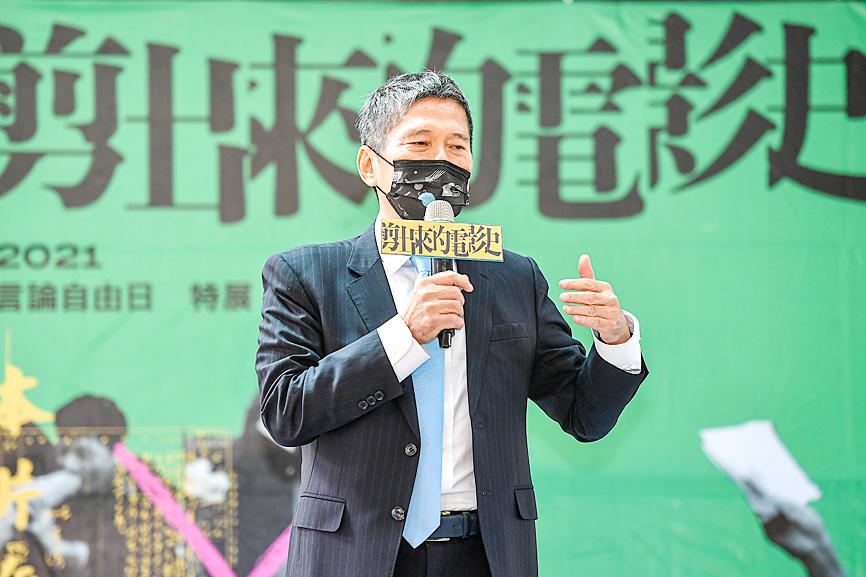A series of lectures, film screenings and discussions are to be held in Taipei through April 25 to mark Freedom of Speech Day, which was yesterday.
The events, which began yesterday, are being organized by the Ministry of the Interior, the Memorial Foundation of 228 and the Nylon Cheng Liberty Foundation.
The series, with the theme of “On the Road to Freedom of Speech,” comprises the “Human Library” lecture series, as well as the Human Rights and Freedom Film Festival and post-screening discussions, the organizers said.

Photo: CNA
From 2pm to 4pm on Saturday, Institute of Watch Internet Network chief executive officer Huang Yi-feng (黃益豐) is to give a lecture on the difference between freedom of speech on the Internet and cyberbullying, as well as regulation and self-discipline within the context of free speech online, they said.
From 3pm to 5pm on Saturday next week, Taiwan FactCheck Center editor-in-chief Summer Chen (陳慧敏) is to give a lecture exploring the purpose of the dissemination of false news, and how to identify such reports, the organizers said.
From 2pm to 4pm on April 24, Ou Su-ying (歐素瑛), a history professor at National Taiwan University, is to give a lecture discussing freedom of speech on school campuses, they said.
Screenings of South Korean director Kim Ui-seok’s debut feature After My Death, Oscar-nominated The Post by director Steven Spielberg, and the 2018 thriller Searching by director Aneesh Chaganty are to begin at 2pm on Sunday, on April 18 and on April 25 respectively, the organizers said.
The screenings are to be followed by discussions led by counseling psychologist Lin Chen-yi (林甄儀), Plain Law Movement senior editor Wang Ting-yu (王鼎棫) and UN Office of Information and Communications Technology consultant Jack Huang (黃一展) respectively, they added.
The events are to be held at the National 228 Memorial Museum in Zhongzheng District (中正), the organizers said.
April 7 was declared Freedom of Speech Day by the Executive Yuan in December 2016 to commemorate the death of democracy activist Deng Nan-jung (鄭南榕, also known as Nylon Cheng).
Deng, who founded the magazine Freedom Era Weekly in 1984 to fight for “100 percent freedom of speech,” died by self-immolation on April 7, 1989, as police broke into his office after he had been barricaded inside for 71 days to avoid arrest after he was charged with sedition for having printed a draft “Republic of Taiwan constitution” in 1988.
Taiwan’s path to achieving freedom of speech has been a “bumpy” one, Minister of the Interior Hsu Kuo-yung (徐國勇) said yesterday at the series’ opening ceremony at the museum, adding that it took hard work to reach the level of freedom the nation enjoys today.
The nation’s hard-won freedom of speech was made possible due to the sacrifice of individuals like Deng, Hsu said, urging people to defend it with “all our strength.”
More information about the events can be found at www.228.org.tw or www.moi.gov.tw.

Taiwan has received more than US$70 million in royalties as of the end of last year from developing the F-16V jet as countries worldwide purchase or upgrade to this popular model, government and military officials said on Saturday. Taiwan funded the development of the F-16V jet and ended up the sole investor as other countries withdrew from the program. Now the F-16V is increasingly popular and countries must pay Taiwan a percentage in royalties when they purchase new F-16V aircraft or upgrade older F-16 models. The next five years are expected to be the peak for these royalties, with Taiwan potentially earning

POSITIVE DEVELOPMENT: Japan and the US are expected to hold in-depth discussions on Taiwan-related issues during the meeting next month, Japanese sources said The holding of a Japan-US leaders’ meeting ahead of US President Donald Trump’s visit to China is positive news for Taiwan, former Japan-Taiwan Exchange Association representative Hiroyasu Izumi said yesterday. After the Liberal Democratic Party’s landslide victory in Japan’s House of Representatives election, Japanese Prime Minister Sanae Takaichi is scheduled to visit the US next month, where she is to meet with Trump ahead of the US president’s planned visit to China from March 31 to April 2 for a meeting with Chinese President Xi Jinping (習近平). Japan and the US are expected to hold in-depth discussions on Taiwan-related issues during the

‘LIKE-MINDED PARTNER’: Tako van Popta said it would be inappropriate to delay signing the deal with Taiwan because of China, adding he would promote the issue Canadian senators have stressed Taiwan’s importance for international trade and expressed enthusiasm for ensuring the Taiwan-Canada trade cooperation framework agreement is implemented this year. Representative to Canada Harry Tseng (曾厚仁) in an interview with the Central News Agency (CNA) said he was increasingly uneasy about Ottawa’s delays in signing the agreement, especially as Ottawa has warmed toward Beijing. There are “no negotiations left. Not only [is it] initialed, we have three versions of the text ready: English, French and Mandarin,” Tseng said. “That tells you how close we are to the final signature.” Tseng said that he hoped Canadian Prime Minister Mark Carney

STAY IN YOUR LANE: As the US and Israel attack Iran, the ministry has warned China not to overstep by including Taiwanese citizens in its evacuation orders The Ministry of Foreign Affairs (MOFA) yesterday rebuked a statement by China’s embassy in Israel that it would evacuate Taiwanese holders of Chinese travel documents from Israel amid the latter’s escalating conflict with Iran. Tensions have risen across the Middle East in the wake of US and Israeli airstrikes on Iran beginning Saturday. China subsequently issued an evacuation notice for its citizens. In a news release, the Chinese embassy in Israel said holders of “Taiwan compatriot permits (台胞證)” issued to Taiwanese nationals by Chinese authorities for travel to China — could register for evacuation to Egypt. In Taipei, the ministry yesterday said Taiwan